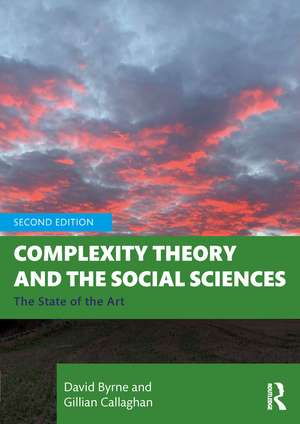Complexity Theory and the Social Sciences: The State of the Art
Autor David Byrne, Gillian Callaghanen Limba Engleză Paperback – 26 sep 2022
The book reviews complexity theory in the practice of the social sciences and at their interface with ecological science. It outlines how social theory can be reconciled with complexity thinking and presents a review of the way research can be done using complexity theory. The book suggests how complexity theory can be used to understand and evaluate governance processes, particularly with regard to social inequality and the climate crisis. The impact of the COVID-19 pandemic is also examined through a complexity lens, reviewing how complexity thinking has been employed in relation to the pandemic and how implementing a complexity framework can transform health and social care. The book concludes with a call to action and the use of complexity theory to inform critical thinking in the education system.
This textbook will be immensely useful to students and researchers interested in social research methods, social theory, business and organization studies, health, education, urban studies, and development studies.
| Toate formatele și edițiile | Preț | Express |
|---|---|---|
| Paperback (1) | 281.03 lei 3-5 săpt. | +21.82 lei 10-14 zile |
| Taylor & Francis – 26 sep 2022 | 281.03 lei 3-5 săpt. | +21.82 lei 10-14 zile |
| Hardback (1) | 1022.78 lei 6-8 săpt. | |
| Taylor & Francis – 26 sep 2022 | 1022.78 lei 6-8 săpt. |
Preț: 281.03 lei
Nou
Puncte Express: 422
Preț estimativ în valută:
53.78€ • 55.83$ • 44.84£
53.78€ • 55.83$ • 44.84£
Carte disponibilă
Livrare economică 01-15 martie
Livrare express 18-22 februarie pentru 31.81 lei
Preluare comenzi: 021 569.72.76
Specificații
ISBN-13: 9781032100869
ISBN-10: 1032100869
Pagini: 258
Dimensiuni: 174 x 246 x 25 mm
Greutate: 0.43 kg
Ediția:2 ed
Editura: Taylor & Francis
Colecția Routledge
Locul publicării:Oxford, United Kingdom
ISBN-10: 1032100869
Pagini: 258
Dimensiuni: 174 x 246 x 25 mm
Greutate: 0.43 kg
Ediția:2 ed
Editura: Taylor & Francis
Colecția Routledge
Locul publicării:Oxford, United Kingdom
Public țintă
Postgraduate and UndergraduateNotă biografică
David Byrne is Emeritus Professor of Sociology and Applied Social Science at Durham University, UK. His research interests include complexity theory, post-industrial social structures, urban systems, taxation policy, the privatization of welfare systems, quantitative methods, and case-based methods. He is the author of Applying Social Science: The Role of Social Research in Politics, Policy and Practice (Policy Press, 2011), Class after Industry (Palgrave Macmillan, 2018) and Inequality in a Context of Climate Crisis after COVID: A Complex Realist Approach (Routledge, 2021) and co-author of Complexity Theory and the Social Sciences: The State of the Art (First Edition, Routledge, 2013) and Paying for the Welfare State in the 21st Century (Policy Press, 2017).
Gillian Callaghan is a teacher of social theory and qualitative methods and an experienced evaluator of social and health interventions. Her research interests include complexity theory, deindustrialization and post-industrial social structure, class, social capital and community, and issues of power, participation, and governance. She is the author of numerous journal articles and co-author of Complexity Theory and the Social Sciences: The State of the Art (First Edition, Routledge, 2013).
Gillian Callaghan is a teacher of social theory and qualitative methods and an experienced evaluator of social and health interventions. Her research interests include complexity theory, deindustrialization and post-industrial social structure, class, social capital and community, and issues of power, participation, and governance. She is the author of numerous journal articles and co-author of Complexity Theory and the Social Sciences: The State of the Art (First Edition, Routledge, 2013).
Cuprins
Introduction, 1. A manifesto for interdisciplinarity founded on the complexity frame of reference, 2. The complexity frame of reference and action, 3. Doing complexity science, 4. Evolutionary social theory, 5. Structure and agency, 6. Time and place, 7. Social theory and macro system transformation, 8. Complexity theory and the qualitative research programme, 9. Quantitative methods for exploring, understanding, and possibly predicting complex social systems and their intersection with natural systems, 10. Complexity and mixed methods, 11. Modes of governance, 12. Evaluation in a complexity frame, 13. Explicit complexity evaluation, 14. Shaping research and policy, 15. Beyond disciplines and fields: COVID and a world in crisis, Conclusion
Descriere
This expanded and updated edition revisits the use of complexity theory across the social sciences and demonstrates how complexity informs approaches to various contemporary issues in the context of the COVID-19 pandemic, widening social inequality, and impending social and ecological catastrophe wrought by global warming.
